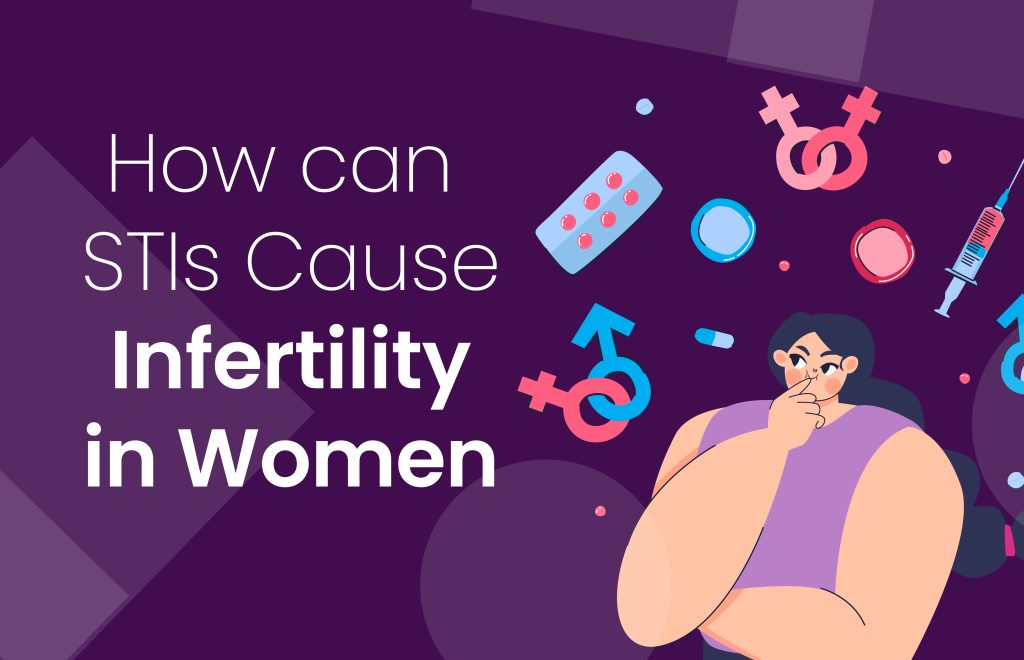The journey to motherhood is one of life’s most cherished aspirations for many women. Yet, the path is not always straightforward. Despite the hopes and dreams, many face the heartache of infertility. This can be tough, especially if you do not know the specific reason behind it. Sexually Transmitted Infections (STIs) are among the numerous factors that contribute to infertility in women. STIs can secretly mess with your ability to get pregnant. Did you know that STIs, if not treated, can cause long-term complications that will permanently affect your reproductive system? This article talks about how these infections lead to female infertility and emphasizes the importance of prevention, early detection, and treatment.
What are STIs?
In simpler terms, STI stands for “Sexually Transmitted Infection”. This is a wide label that includes infections mainly passed on through sexual activity. The STIs are caused by bacteria, viruses, or parasites and can be transmitted through intimate acts such as vaginal, anal, or oral sex. Certain STIs like syphilis and HIV can also be contracted in non-sexual ways, such as via blood transfusions or from a mother to her baby during childbirth. A crucial characteristic of STIs is their ability to not show any symptoms, especially in women. This means that infections can continue and advance without any noticeable obvious signs.
Common STIs That Affect Female Fertility
Certain STIs have a profound impact on female fertility:
- Chlamydia: A common bacterial STI, Chlamydia often goes unnoticed due to mild or no symptoms. Untreated, it can lead to serious reproductive system complications.
- Gonorrhea: Also bacterial, Gonorrhea can affect the cervix, uterus, and fallopian tubes, potentially leading to severe pelvic infections.
- HPV (Human Papillomavirus): While most HPV infections resolve naturally, certain strains can cause genital warts and increase the risk of cervical cancer.
- HIV/AIDS: Although not directly linked to infertility, HIV/AIDS can compromise the immune system, leading to secondary infections that can impact reproductive health.
These infections often remain asymptomatic, emphasizing the importance of regular screenings to detect and treat them early.
The Path from STIs to Infertility
Pelvic Inflammatory Disease (PID):
RehumanizeOne of the most serious complications of untreated STIs is Pelvic Inflammatory Disease (PID). PID is an infection in a woman’s reproductive organs. Chlamydia and Gonorrhea primarily cause PID. This infection can spread to the uterus, fallopian tubes that carry eggs, and ovaries that make eggs. This causes swelling and scarring. Scarring can block the tubes so sperm can not meet the egg.
Endometritis:
Endometritis is another problem. It means the lining of the uterus is inflamed. Bacteria of untreated STIs can travel up into the uterus and cause ongoing swelling. This makes it much harder for a fertilized egg to implant and grow into a baby.
Ectopic Pregnancy:
This kind of pregnancy happens when a fertilized egg gets stuck in the wrong place, usually in the egg tube. Chlamydia and Gonorrhea can scar the tubes, raising the chance of an ectopic pregnancy. These pregnancies can not continue normally and can put the mother’s health at big risk.
Prevention and Early Detection
Prevention is unarguably the most effective strategy to combat STIs and related fertility issues:
- Safe Sex Practices: The consistent use of condoms significantly reduces the risk of STI transmission.
- Vaccinations: Vaccines like the HPV vaccine protect against the strains that most commonly lead to cervical cancer.
Regular STI Screenings:
Early detection through regular screenings is crucial, especially since some infections remain asymptomatic. Routine testing helps identify infections early, allowing for prompt treatment before they cause permanent damage.
Treatment Options and Managing Fertility Concerns
Treatment for STIs generally involves antibiotics for bacterial infections or antiviral medications for viral ones. Adhering to prescribed treatments is crucial to ensure the infection is fully eradicated.
For those who have suffered from infertility due to STIs, several fertility treatments might be considered:
- Fertility Medications: Drugs can stimulate ovulation or support hormone regulation.
- Surgery: In cases where scarring has blocked the fallopian tubes, surgery may help restore tubal patency.
- Assisted Reproductive Technology (ART): In vitro fertilization (IVF) is a common ART method that bypasses damaged fallopian tubes, enabling fertilization outside the body.
Wrapping It Up
Understanding the reasons for infertility in women is crucial for preventive and proactive healthcare. STIs, while preventable, can lead to significant reproductive health issues if left untreated. By embracing safe sex practices, routine screenings, and early treatment, women can significantly reduce the risk of STIs affecting their fertility. For those already facing fertility issues due to STIs, various treatments offer hope, allowing many women to still achieve their dreams of motherhood.

